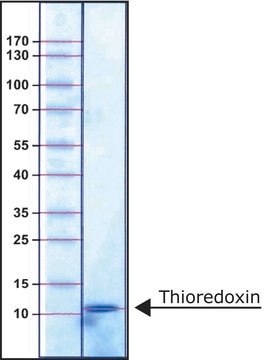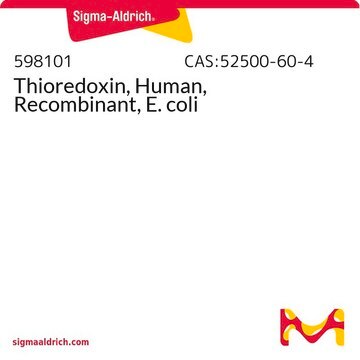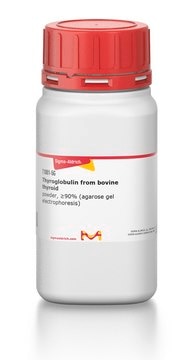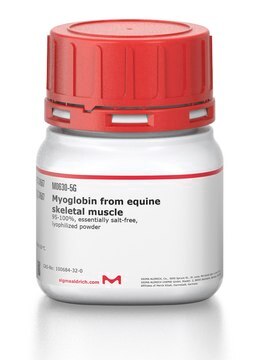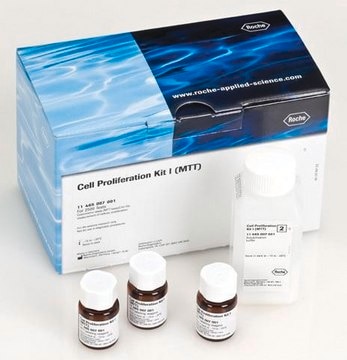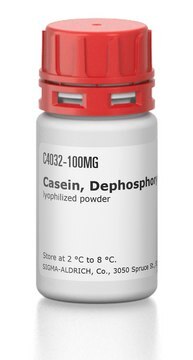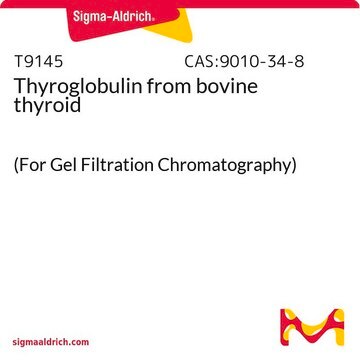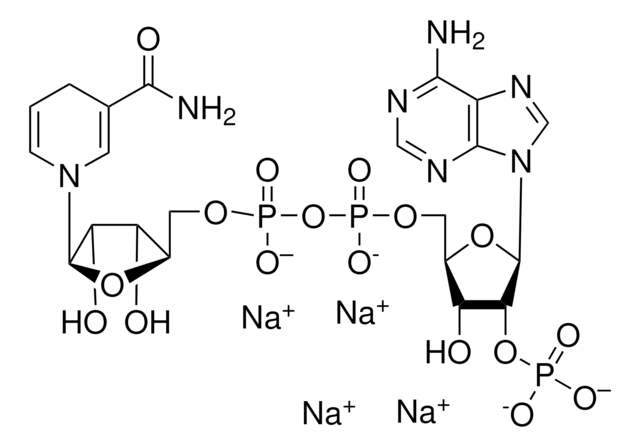T8690
Thioredoxin human
≥90% (SDS-PAGE), recombinant, expressed in E. coli (N-terminal histidine tagged), essentially salt-free, lyophilized powder, ≥5 U/mg
Sign Into View Organizational & Contract Pricing
All Photos(2)
About This Item
Recommended Products
biological source
human
Quality Level
recombinant
expressed in E. coli (N-terminal histidine tagged)
assay
≥90% (SDS-PAGE)
form
essentially salt-free, lyophilized powder
specific activity
≥5 U/mg
technique(s)
activity assay: suitable
UniProt accession no.
application(s)
cell analysis
storage temp.
−20°C
Gene Information
human ... TXN(7295)
General description
Cloned from Jurkat cell cDNA. Identical to the ADF/Trx (GenBank® Accession Number X77584) and the thioredoxin from human placenta (GenBank® Accession Number AF085844).
Thioredoxin (TXN) is a 12 kDa ubiquitous protein. The gene is located on human chromosome 9q31.3. TXN is mainly located in the cytoplasm.
Application
Thioredoxin human can be used for in vitro thioredoxin assay. The product can also be used for assessing Thioredoxin reductase (TRXR) enzyme activity.
Thioredoxin human has been used:
- in mitogen-activated protein kinase kinase 4 (MKK4) in vitro kinase assay
- to study its role in transcription regulation, RNA processing and nuclear pore function in human cells
- in proteomics identification of Trx1 reduction target proteins from the hearts of cardiac specific transgenic (Tg)-Trx1 mice
Biochem/physiol Actions
Human Thioredoxin is a recombinant, N-terminal histidine tagged protein. The product induces proliferation in lymphoid cells, fibroblasts as well as in numerous human solid tumor cell lines.The product also stimulates growth in normal as well as leukemic B cell, modifies the transcriptional activity of AP-1and inhibits the apoptosis signal-regulating kinase 1 (ASK1).
Thioredoxin (TXN) has disulfide-reducing activity. It acts as a cytokine to reduce inflammation. TXN functions as a scavenger for reactive oxygen intermediates (ROIs), which are produced in various oxidative stress. Thioredoxin induces cellular proliferation to decrease oxidative stress. TXN is a prognostic biomarker for various cancers, such as lung, pancreatic and hepatocellular carcinoma. It contributes to protein reduction, tissue development and redox regulation.
Mediates the reduction of disulfide bonds in proteins.
Unit Definition
One unit will cause a ΔA650 of 1.0 in 1 min at 25 °C in the insulin reduction assay.
Legal Information
GenBank is a registered trademark of United States Department of Health and Human Services
Storage Class
11 - Combustible Solids
wgk_germany
WGK 3
flash_point_f
Not applicable
flash_point_c
Not applicable
ppe
Eyeshields, Gloves, type N95 (US)
Certificates of Analysis (COA)
Search for Certificates of Analysis (COA) by entering the products Lot/Batch Number. Lot and Batch Numbers can be found on a product’s label following the words ‘Lot’ or ‘Batch’.
Already Own This Product?
Find documentation for the products that you have recently purchased in the Document Library.
Customers Also Viewed
Elucidation of thioredoxin target protein networks in mouse
Fu C, et al.
Molecular and Cellular Proteomics, 8(7), 1674-1687 (2009)
Christopher J Boehler et al.
PloS one, 8(8), e71525-e71525 (2013-08-13)
Thioredoxin reductase-1 (TRXR-1) is the sole selenoprotein in C. elegans, and selenite is a substrate for thioredoxin reductase, so TRXR-1 may play a role in metabolism of selenium (Se) to toxic forms. To study the role of TRXR in Se
Shaoxiong Wang et al.
Journal of the American Heart Association, 8(8), e012192-e012192 (2019-04-09)
Background Dopamine D5 receptor (D5R) plays an important role in the maintenance of blood pressure by regulating renal sodium transport. Our previous study found that human D5R mutant F173L transgenic ( hD 5 R F173L-TG) mice are hypertensive. In the
Identification of novel nuclear targets of human thioredoxin 1
Wu C, et al.
Molecular and Cellular Proteomics, mcp-M114 (2014)
Thioredoxin activates MKK4-NFkappaB pathway in a redox dependent manner to control manganese superoxide dismutase gene expression in endothelial cells
Kundumani-Sridharan V, et al.
The Journal of Biological Chemistry, jbc-M115 (2015)
Our team of scientists has experience in all areas of research including Life Science, Material Science, Chemical Synthesis, Chromatography, Analytical and many others.
Contact Technical Service